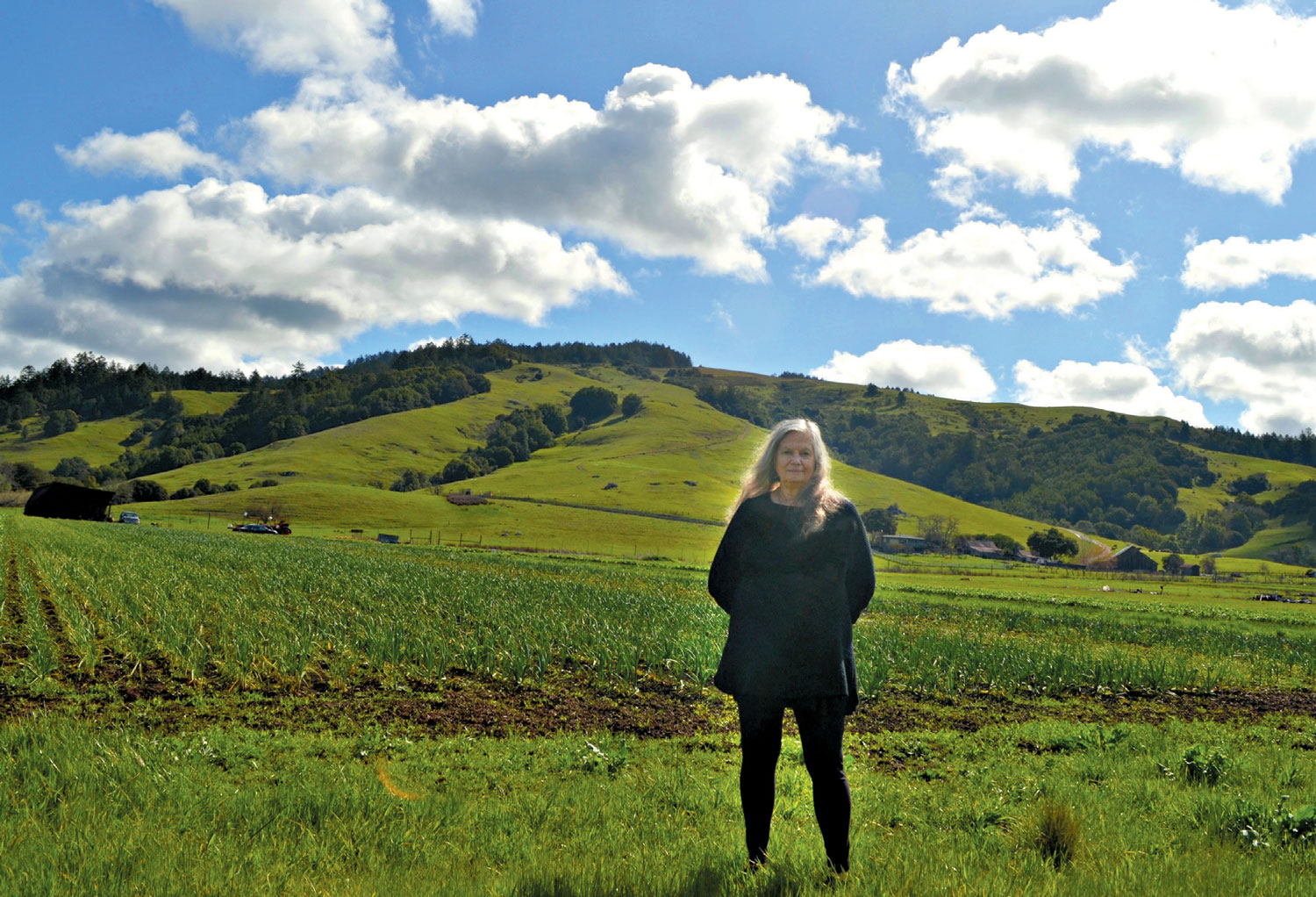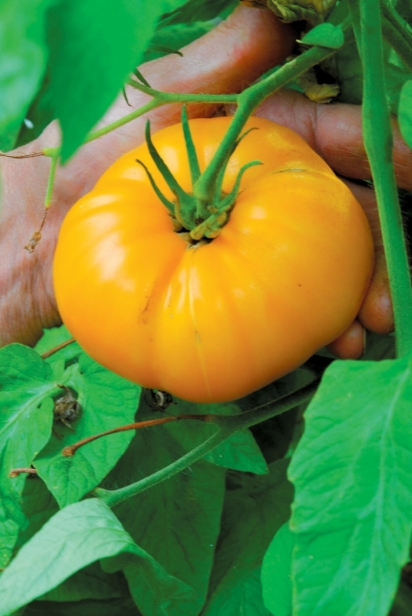Farming is an ancient pleasure
MEET JANET BROWN, STAR OF ALLSTAR ORGANICS
Janet Brown is the type of person many of us aspire to be “when we grow up”: hardworking and open-hearted, worldly wise yet young-at-heart, articulate and erudite, yet happy to get her hands dirty. She is also a successful businesswoman with an enduring desire to serve her community and improve broader food system policies.
I meet Brown, one of the North Bay’s founding mothers of organic farming, at the 10-acre parcel in Nicasio that she and her husband, Marty Jacobson, lease from the Lefranchi family. This spot, they learned the hard way, is perfect for cool-weather crops ... but not so much for tomatoes.
“We had farmed for three years and thought we were just the best farmers,” says Brown, chuckling. “We had big-time heirloom tomatoes growing here, until a frost came along in July and we lost everything.” She breaks into an all-out laugh at the recollection, which tells you everything you need to know about why she is a successful farmer. Learning things the hard way is a way of life for a farmer, as Brown notes.
In addition to the Lefranchi plot, where they now sow cool-weather crops, and two acres of terraced herb gardens at their home in Lagunitas, Brown and Jacobson also lease 30 acres in West Petaluma where they successfully grow those famous heirloom tomatoes, as well as all sorts of peppers—crops that thrive in a slightly warmer climate.
In Nicasio, Brown gives me a tour of the cultivated fields that stretch out across the valley: fava, green garlic, hard-necked garlic, leeks, spring onion, Spanish Calcot onion. These plants thrive in the lowlands, loving the cool nights and temperate days. We trudge through a surprise wetland, our shoes submerging and filling with sludge. Brown laughs again, and it’s contagious; how lucky we are to be out here surrounded by the majesty of these rolling hills. The soil is dark, the crops robust—vibrantly green and you can almost hear them growing. In a distant fallow field a coyote jumps and paws at the ground, looking downright silly as he pursues underground critters.
Brown was in her late 40s when she became a farmer. That was when she and Jacobson decided to move on from their careers in sales and marketing and advertising, respectively. “For so many years we had worked to make other people’s enterprises successful, and then we decided to take a chance. We thought, ‘Let’s bet on ourselves!’”
Fast-forward 25 years and “a formidable learning curve,” (Brown’s words) and their Allstar Organics brand certified organic produce is a huge draw at the Saturday farmers’ market at the San Francisco Ferry Building. Allstar produce, as well as their specialty herbs and flavored salts and sugars, also make regular appearances in the dishes of renowned restaurants across the region including Madera at the Rosewood Sand Hill Resort in Menlo Park, San Francisco’s Central Kitchen and Seven Hills, and Bull Valley Roadhouse in Port Costa. Allstar produce, salts, sugars and natural herbal hydrosols appear on the shelves of local grocers including Whole Foods, Good Earth and Woodlands.
Sue Connelly and Peggy Smith, founders of Cowgirl Creamery, describe Brown and Jacobson’s offerings as the “best herbs, tomatoes, peppers and herbal salts we have ever tasted,” crowning their own award-winning Devils Gulch cheese with a blend of Allstar dried peppers, and seasonal favorite Pierce Point cheese with a mix of Thai basil, calendula field flowers and chamomile from Allstar.
In fact, in the late ’90s, Connelly and Smith gave Brown her first major order. That was the moment when Brown realized that “the farming thing” was really happening. It’s remarkable, she says, how many local farmers and artisans will tell you they got their big break via an order from Cowgirl Creamery. “Peggy and Sue are a perfect example of women using a cooperative business model,” says Brown. “They’ve always approached things saying, ‘How can we help you?’” This thoughtful community-oriented stance is an “underlying impulse” to women in agriculture, Brown believes, and the success of Cowgirl epitomizes the long-term power of that approach.
Brown herself exemplifies this approach. She recalls being at an Ecological Farming conference at the Asilomar Conference Grounds in Pacific Grove not long after she began farming when a sign that read “Community Food Security” caught her eye. She followed the arrow on that sign and the talk she heard “changed everything.” “I developed a systems perspective about food policy, how all the pieces fit together in a community,” Brown says.
She joined the Marin Food Policy Council in 1998, and went on to serve as its chair for almost 20 years, working to address issues around food justice in Marin County, namely access, nutrition and distribution. While appreciating the many ways that Marin County sets the bar for sustainable and organic food production, she has also turned her attention to glaring disparities, such as the fact that studies have shown that the average life expectancy for residents of Marin City is at least 15 years shorter than those in Ross.
“The important concept in a food system is taking care of all residents at all times,” says Brown. She was also a founding member of Marin Organic [which has since ceased operation] and has been recognized by the Marin County Board of Supervisors for her food policy advocacy. She is currently on the board of the Agricultural Institute of Marin (AIM), the nonprofit that, among other things, operates the Sunday and Thursday farmers’ markets as the Marin Civic Center, and is a vocal advocate for AIM’s eff orts to build a permanent market at the Civic Center.
“Our olive oil, our cheeses, our produce ... We are producing high-end food in this county. We have been called the Normandy of the United States, and the new market would help establish Marin as the center of food production it is.”
Not surprisingly, Brown is also an advocate for school garden programs. “I go to schools to talk to kids and they shake their heads. They’re skeptical I’m a farmer. They’ve heard about farmers, but they’ve never seen one. Like we’re unicorns!” she giggles. These school visits are an important way for her to introduce girls to the notion of female farmers: “Farming is not traditionally thought of for women, but girls, when given any encouragement and role models, will follow those examples and excel.”
Her approach is to help kids to understand that they can start small in the world of food production, maybe something as simple as making cookies and selling them to friends and family. She wants them to understand the meaning of the term “value added,” she says. “I want them to understand that they—their work and creative and artistic vision—are the value that is added.”
After circumnavigating the Allstar fields in Nicasio, Brown and I travel to her home on a hillside in Lagunitas, where we tour her studio, a former carport turned gorgeous and immaculate commercial kitchen. This is where she brings her own “work, creative and artistic vision” to the production of Allstar salts, sugars, herb mixes and hydrosols. Drying racks full of aromatic herbs and peppers, vats of salts, boxes of labels and bottles fill the space. Value-add in progress.
We meander outside and up into the terraced sea of purple blossoming lavender just outside her back door. Here, Brown looks organic to the landscape, completely at ease and at home. “Farming is an ancient pleasure,” she tells me. “You act appropriately with nature and nature will meet you more than halfway. I am so lucky to be able to choose a life interlaced with the natural world.”






